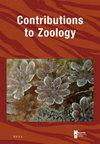Does the grey mouse lemur use agonistic vocalisations to recognise kin?
IF 2.2
2区 生物学
Q1 ZOOLOGY
引用次数: 3
Abstract
Frequent kin-biased coalitionary behaviour is a hallmark of mammalian social complexity. Furthermore, selection to understand complex social dynamics is believed to underlie the co-evolution of social complexity and large brains. Vocalisations have been shown to be an important mechanism with which large-brained mammals living in complex social groups recognise and recruit kin for coalitionary support during agonistic conflicts. We test whether kin recognition via agonistic calls occurs in a small-brained solitary foraging primate living in a dispersed social network, the grey mouse lemur (Microcebus murinus, Miller JF, 1777). As mouse lemurs are frequent models for ancestral solitary foraging mammals, this study examines whether kin recognition via agonistic calls could be the foundation from which more complex, kin-based coalitionary behaviour evolved. We test whether female wild mouse lemurs in Ankarafantsika National Park, Madagascar, react differently to agonistic calls from kin and nonkin and to calls from familiar and unfamiliar individuals during playback experiments. Subjects showed no significant differences in reactions to the different stimuli; thus they did not react differently based upon kinship or familiarity. Results suggest that this solitary foraging species does not use agonistic calls to recognise kin and monitor agonistic interactions involving kin, unlike several species of Old World monkeys and hyenas. Thus, kin recognition via agonistic calls may have evolved independently in these lineages in parallel with greater social complexity and frequent coalitionary behaviour.灰鼠狐猴会用痛苦的叫声来识别亲属吗?
频繁的亲属偏见联盟行为是哺乳动物社会复杂性的标志。此外,理解复杂社会动态的选择被认为是社会复杂性和大大脑共同进化的基础。发声已被证明是一种重要机制,生活在复杂社会群体中的大脑较大的哺乳动物通过发声来识别并招募亲属,以在痛苦的冲突中获得联盟支持。我们测试了一种生活在分散的社交网络中的大脑较小、孤独觅食的灵长类动物灰鼠狐猴是否会通过痛苦的叫声进行亲属识别(Microcebus murinus,Miller JF,1777)。由于鼠狐猴是祖先独居觅食哺乳动物的常见模型,这项研究考察了通过痛苦的叫声识别亲属是否可能是进化出更复杂、基于亲属的联盟行为的基础。我们测试了马达加斯加Ankarafansika国家公园的雌性野生鼠狐猴在回放实验中对亲属和非亲属的痛苦叫声以及熟悉和陌生个体的叫声是否有不同的反应。受试者对不同刺激的反应没有显著差异;因此,他们的反应不会因亲属关系或熟悉程度而有所不同。结果表明,与旧世界的几种猴子和鬣狗不同,这种单独觅食的物种不会使用痛苦的叫声来识别亲属并监测涉及亲属的痛苦互动。因此,通过痛苦呼叫的亲属识别可能在这些谱系中独立进化,同时伴随着更大的社会复杂性和频繁的联盟行为。
本文章由计算机程序翻译,如有差异,请以英文原文为准。
求助全文
约1分钟内获得全文
求助全文
来源期刊

Contributions to Zoology
生物-动物学
CiteScore
4.00
自引率
4.50%
发文量
16
审稿时长
>12 weeks
期刊介绍:
Contributions to Zoology solicits high-quality papers in all systematics-related branches of comparative zoology (including paleozoology). Preference will be given to manuscripts dealing with conceptual issues and to integrative papers (e.g., ecology and biodiversity, morphology and phylogeny and character state evolution, phylogeny and historical biogeography, systematics and bioinformatics, bioinformatics and biodiversity, habitat disturbance and biogeography, etc.). Reviews and alpha-taxonomic contributions are considered for publication, but acceptance will depend on their high quality and exceptional nature.
 求助内容:
求助内容: 应助结果提醒方式:
应助结果提醒方式:


